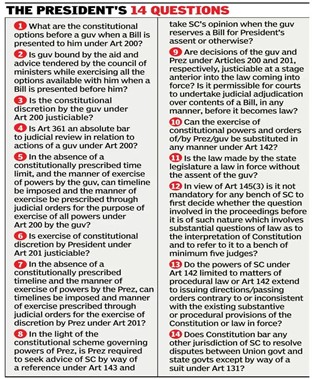President Seeks SC View on Bills Timeline Issue
President Seeks SC View on Bills Timeline Issue
Why in the News ?
President Droupadi Murmu has invoked Article 143 of the Constitution to seek the Supreme Court’s advisory opinion on whether timelines can be mandated for the President and Governors to act on Bills passed by state legislatures, following the April 8 ruling.
Context: Presidential Reference and SC Advisory Role
- President Murmu referred 14 legal questions to the SC under Article 143(1) seeking its non-binding opinion.
- Triggered by the SC’s April 8 judgment in the R N Ravi case, which mandated a 3-month timeline for Presidential assent to Bills.
- Reference raises broader concerns about Centre-state relations and judicial discretion.
- Advisory jurisdiction is exercised on issues of public importance, requiring opinion from a 5-judge bench under Article 145(3).
- SC has the discretion to accept or decline answering such references.
Legal and Constitutional Debates Raised
- Can the SC set timelines for the President or Governors to act on Bills?
- Should such critical constitutional questions be heard only by larger Benches?
- Raises concerns over Article 142—the SC’s discretionary power to ensure “complete justice”.
- Questions whether Centre-state disputes can be heard outside SC’s exclusive jurisdiction under Article 131.
-
SC had earlier declined similar references in 1982 and 1993, citing pending suits or secularism.
Political and Institutional Implications
- The April 8 verdict empowered states to file writs of mandamus against the President.
- Critics argue the ruling infringes on Parliamentary supremacy and the President’s dignity.
- AG Venkataramani and VP Dhankhar flagged judicial overreach and breach of separation of powers.
- Reflects a long-standing Parliament-judiciary tussle, echoing past confrontations like the Kesavananda Bharati case on property rights and constitutional amendments.




